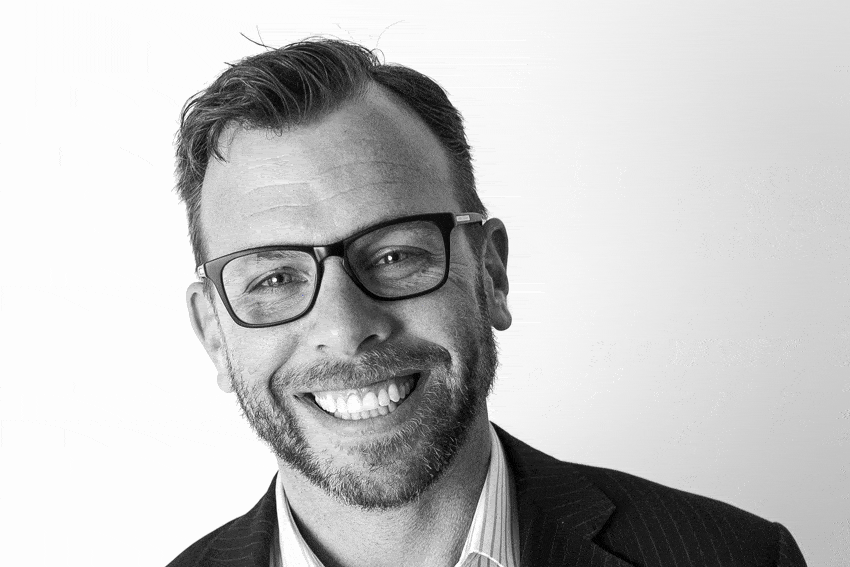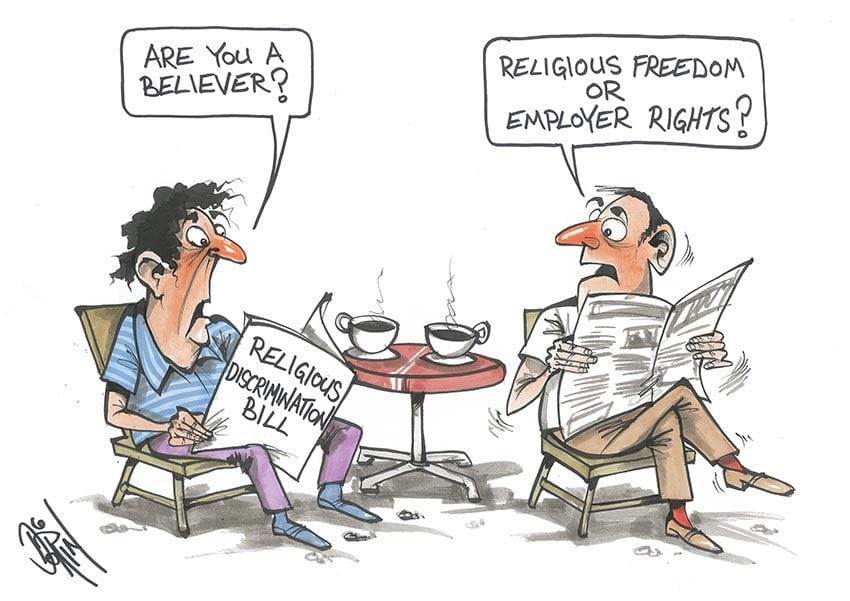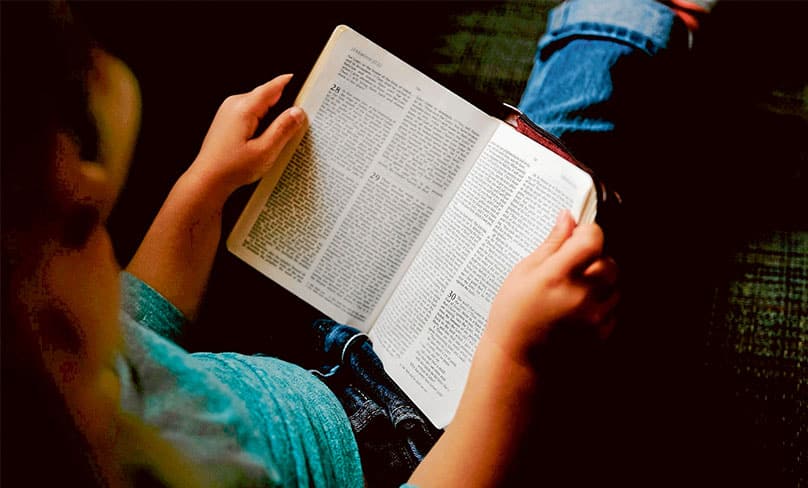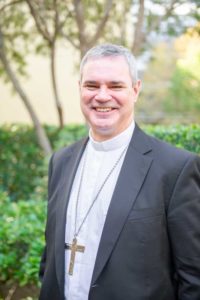
Helping Christians caught between faith and the law
John Steenhof is the principal lawyer at the Human Rights Law Alliance, a not-for-profit law firm established to assist Christians who face hostility for their religious beliefs in a variety of forums. A devout Christian and married father of six children aged four to 17, John originally worked as a commercial lawyer and in boutique law firms, including one he established with his brother Simon in Perth.
He and his wife Lana left their tight-knit extended family in Perth to take on the role in Canberra. With two other lawyers working alongside him, John has a front-row seat to what he describes as an increasingly fractious Australian society in which it is possible for those who hold Christian views to be judged dangerous and silenced.
How did you end up working in the area of religious freedom?
Around 2017 we met Martyn Iles who was then the managing director of the Human Rights Law Alliance. At that time, it was a clearing house for cases involving religious freedom and a division within the Australian Christian Lobby.
They needed lawyers to assist with cases and given our strong religious convictions and our interest in religious freedom matters we volunteered our services for pro bono work.
 In 2019 there was a group that wanted to start the HRLA as an independent law firm that would be able to represent clients directly and take on cases. I had the requisite experience having run and set up my own law firms in the past and I was approached.
In 2019 there was a group that wanted to start the HRLA as an independent law firm that would be able to represent clients directly and take on cases. I had the requisite experience having run and set up my own law firms in the past and I was approached.
After some soul searching, prayer and consideration with the family we decided that it was God’s call for us to move to Canberra and to take up this position. It was really a matter of weighing up where our gifts lay and where our calling was.
What was your first case at HRLA?
It was a teacher in the Northern Territory who had been posting on a public Facebook forum for his town about his opposition to same sex marriage.
He was sharing articles that were sympathetic to the No campaign which was then a very live issue given the marriage plebiscite, and activists tried to get him fired from his job as a public school teacher.
We were able to ensure that he didn’t face disciplinary action at work and that he was able to continue on with his livelihood and to engage in public discussion on same sex marriage. It was an eye-opener to see how people who don’t like the ideas or the convictions of certain people, particularly Christians, often don’t engage with those ideas but will try to attack that person though other means, and it was our first exposure to what’s commonly called cancel culture.
What does HRLA do today?
We are exceptionally busy running cases. Our consultation service for anyone experiencing difficulties with freedom of speech, thought, expression or conscience, deals with multiple enquiries each week as well.
We try to find the best strategic legal cases to bring that are going to protect religious freedom and give some good precedents that we can rely on to ensure that Christians are free to continue to speak truth in the public square and to ensure religious freedoms that are guaranteed in international law are not eroded within Australia.
We also do a lot of submissions and input into laws that will affect religious freedom that are put forward at state, territory or federal levels, for example conversion therapy bans, religious freedom legislation in NSW, and proposed law reform around vilification laws. We have a wider remit than just working for Christians, for example we’ve also assisted in matters of academic freedom at universities.
What’s the future for religious freedom in this country in your view?
Ideally, as Australia becomes a place of more freedom we’d hope to become smaller until ultimately there would not be a reason for us to exist. But a lot of the time orthodox biblical teaching is not seen as just a bit foolish but as harmful to people and something that needs to be suppressed.
There’s also a tension and friction with very well-established international principals of human rights, which say that people have an absolute right to believe the religion of their choosing and to be able to teach that religion and manifest it in public and in private, subject only to very tight and necessary restrictions.
Would you like to see more positive religious freedom protections in law?
At a principal level it would be good to see less law rather than more law. That’s because every time that you make a positive protection for something you have to have a look at unintended consequences to make sure you’re not protecting too much and that requires all sorts of balancing exercises to be done which lead to very Byzantine systems of law, which makes it harder for ordinary people who are seeking justice.
Ideally we’d like to see that adjustments be made to those laws that have been passed and have been shown that they overreach, in order to reduce their impositions on religious freedom. Having said that we’re pragmatic and we know that we’re going towards a society that has more law rather than less and that there are some situations in which there are good reasons to have positive protection of religious freedom in the existing law.
What is the worst example of overreach into people’s religious freedoms you’ve seen?
The spate of laws passed within the last year in Queensland, the ACT and Victoria called conversion therapy ban laws. The stated purpose of these laws was to stop the arcane and horrific practice of aversion therapy for those who experienced same sex attraction and gender confusion, such as electric shocks or nausea drugs to combat feelings of attraction. However there is no evidence found that these kinds of aversion practices were ever done by religious organisations or religious groups.
And these laws are explicitly targeted at religious beliefs, giving unprecedented powers to government agencies like human rights commissions, and civil and administrative tribunals to invade the very recesses of your home, to be able to police what is said from the pulpit or what you pray in one of your rooms of your church during bible study, for instance.

In Victoria, the Human Rights Commission there said that once these laws come into effect next year they will have everything in place to start educating churches on what they are or are not allowed to teach or say to people in relation to sexual orientation and gender identity issues.
It’s going to be a massive overreach into what is the deeply held convictions of many religious groups, not only Christians, about how we define ourselves and who we are.
Did this shock you?
I was surprised by how the natural protections that are embedded into our Australian legal system called the rule of law, were largely ignored or failed in the assessing of these laws.
They have such ambiguity and overreach that even the law societies in the ACT and in Victoria objected to the draconian criminal sanctions that were being placed not just on a narrow category of people for a narrow set of practice but on potentially anybody. In pushing these laws through parliaments there has been no wide public consultation or proper debate and that’s not a hallmark of good laws.
Why do you think Christian belief and practice is being targeted under these laws?
It’s easy to give a simple answer that explains it in terms of cultural Marxism or the
progress of the left, but I think there are a number of factors involved.
One of those is the increasing secularisation of Australian society, whereby the group that has now the ascendancy and is growing the fastest is the non-religious group. If you look at historical precedents where you see large movements in what the convictions of a society are, it always comes with a lot of tensions and instances of overreach as it tries to establish what the fashionable ideology or religion is.

We also live in a culture that’s increasingly hyper-partisan on both sides. We see a triumph of identity politics and a victim mentally from all sides that immediately cries foul and harm when there are ideas being discussed which a person doesn’t agree with. I think that’s not conducive to a healthy society or to a society in which you can have a confident and robust pluralism.
And I think we’ve lost our attraction to and shared understanding of old-fashioned virtues and instead we have subjective personal values in determining what we think are the highest goods for a flourishing society. That kind of subjectivism leads to a heightened sense of feeling wronged and fundamentally attacked, which leads to a society where people turn to litigation as a tool for protecting themselves from having to discuss in a rational way their differences and beliefs.
Even if an attempt at cancelling somebody or bringing them through a tribunal is not successful, people hear about these cases and they are then afraid to say what they really think on contentious societal topics.
John will be the keynote speaker at a continuing professional development seminar in Sydney for lawyers and others interested in this area of law on 23 March entitled ‘Law and Religion CPD Seminar: Conversion Therapy Laws and Religious Freedom’.
For details see the Human Rights Law Alliance Facebook page.
For more info on Australian religious freedom cases, see https://australiawatch.com.au
Related:
